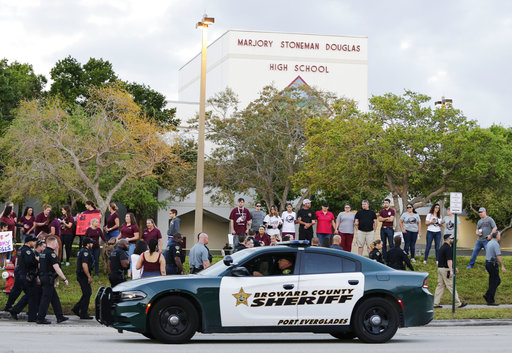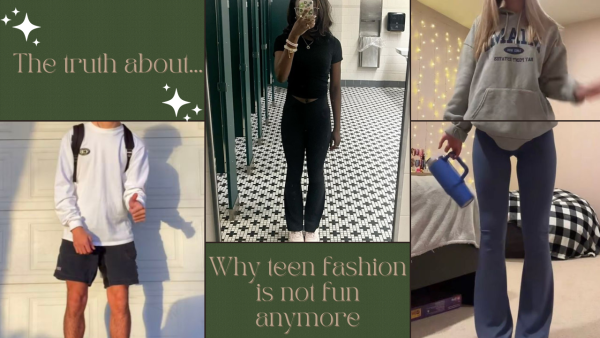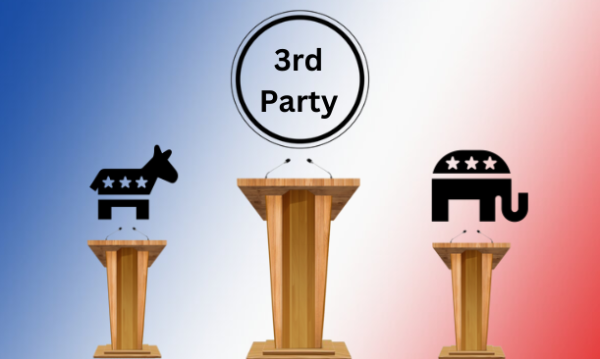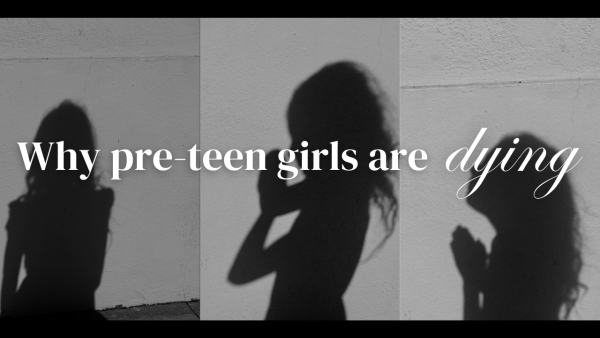The complexity of linking gun control and mental health

In this Feb. 28, 2018 photo, a police car drives by Marjory Stoneman Douglas High School in Parkland, Fla., as students returned to class for the first time since a former student opened fire there with an assault weapon. The United States is in the midst of a national debate over school security after the mass shooting at a Florida school. To President Donald Trump and gun supporters, the solution is to put more guns in the hands of trained school staff _ including teachers _ to play defense against a rampaging gunman. The rest of the world has different strategies to deal with violence around schools. But the U.S. appears to be the only place in the world that wants to arm teachers to the degree the president wants. (AP Photo/Terry Renna)
Following a mass shooting, there is often a rise in discussion about new gun control methods. A common solution is to ban the sale of firearms to people with mental illnesses.
Although the idea makes us feel as if we are finally reaching a solution to the complex issue that is killing Americans, we are not reaching any type of solution at all. In fact, saying that people with mental illnesses should not own a gun is taking America steps back in the process of creating successful gun control laws.
Grouping mentally ill people together in a heap of negativity and seclusion only intensifies the stigma surrounding them. But for some reason, people seem to be coping with mass shootings by blaming mental illness as a whole. If someone with a mental disorder commits a crime, why would the whole society of law abiding mentally ill citizens be punished? Since owning a gun is a fundamental right listed in the Bill of Rights, it shouldn’t be that easy to take the right away from someone with a mental illness.
Most people do not even know what defines someone as being mentally ill. Our society likes to give the term a scary and dangerous connotation, but in reality, more people suffer from mental illnesses than most would think. According to the National Alliance on Mental Illness, approximately 1 in 5 adults in the U.S experiences a mental illness in a given year. One cannot justify the argument that 1 in 5 adults in the U.S should not have a fundamental right of all Americans- especially because 1 in 5 Americans do not participate in mass shootings.
Even if it were possible to perform background checks that allow gun sellers to see one’s mental health history, it is important to note that many mental illnesses are not even remotely connected to mass shootings. Should we be concerned about someone with ADHD, anorexia, bulimia, or an anxiety disorder obtaining a gun? According to those who want to ban the sale of guns to mentally ill people, apparently we should be. The reality of the matter is that mental illnesses encompass a broad scope of disorders that change in severity from person to person. Therefore, being diagnosed with a mental disorder should not automatically mean that you cannot buy a gun. It just makes sense that someone with anorexia disorder would be treated differently than someone with severe depression or schizophrenia when it comes to purchasing firearms.
While there is a staggering number of Americans living with mental illnesses, there are many who go undiagnosed. Being diagnosed with a mental illness is not like being diagnosed with other illnesses. According to the National Alliance on Mental Illness, “unlike diabetes or cancer there is no medical test that can provide a diagnosis of mental illness”, so doctors diagnose patients based off of one’s history of symptoms. In many cases, one may be diagnosed with a mental illness because they are trying to get help for themselves. It takes initiative to make a doctors appointment or to begin rehab or therapy, and that is something great about our healthcare system. Citizens have the option of seeking out help by themselves with privacy. However, if there was a ban on the sale of firearms to the mentally ill, many people would stop seeking self help for fear of being targeted, being stripped of their Second Amendment right, or being put on a database. A decline in the number of people trying to get help for their mental illnesses is the exact opposite of what America needs.
It’s time to stop looking for simple solutions to a complex problem. Just like the idea of banning the sale of firearms to people with mental illnesses, if it sounds too good to be true, it probably is.












Harold A Maio • Mar 11, 2018 at 3:04 pm
Whenever and wherever “the” mentally ill appears, editors ought take careful note. Like “the Blacks it dis-informs caricatures.
Harold A Maio
Brian Haley • Mar 9, 2018 at 2:40 pm
Well written and thought-provoking. It is always easy to look for the simple solution. But simple is often more complicated than people want to think.
Michael Cole • Mar 9, 2018 at 12:28 pm
Well obviously, nobody wants to take away gun rights from people with mental health problems, such as anorexia, bulimia etc. When people talk about the mental health problem, they are talking about people with violent tendencies, that can be a threat to others. The fact of the matter is, the Parkland shooter should have been forcibly admitted to a mental institution, or at the very least a mental treatment center, because he was obviously a threat to others. He made death threats, posed with weapons on his Instagram, talked about killing animals, and not to mention, had law enforcement called on him about thirty times. There needs to be a comprehensive way to restrict violent people that shouldn’t have guns. There is obviously a mental health problem in this country, that is relatively recent, if you look at how many mass shootings there are today compared to before Columbine. As a country, not only do we need to restrict people like the Parkland shooter from owning guns, but we need to assess the root of the mental health problem and put a stop to it. To say mental health is stopping proper gun legislation is not true, as mental health is a huge factor in gun violence.